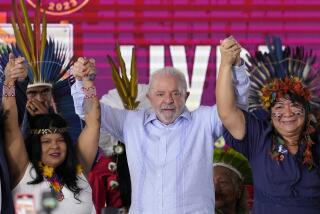Changing the Guard
- Share via
Paraguay’s Gen. Alfredo Stroessner, whose 35 years of iron rule gave him the modern longevity record for Latin American dictators, has been overthrown by a junta with democratic pretensions. But there is scant evidence that the coup amounts to anything more than replacing one dictator with another.
Stroessner had ruled his landlocked nation of 4 million with absolute power since 1954, when he ended a long period of civil strife in Paraguay with a coup. He found the title of dictator distasteful, and created an elaborate facade of democracy in Paraguay that included a political party, the Colorados; the party routinely nominated him for president every four years, and he routinely won with 90% or more of the vote.
Stroessner maintained his grip by jailing or exiling legitimate political opponents and corrupting everyone else. The largest source of foreign exchange in Paraguay has long been contraband, electronic items and other goods smuggled from abroad and sold openly in a black market. Smuggled goods financed the payoffs that kept most of Paraguay’s ruling class, especially the general’s fellow officers, content with the regime.
Only in recent years has Paraguay felt the stirrings of genuine democracy, inspired by new democratic governments in neighboring Brazil and Argentina and by an awareness that Stroessner, now 76, was increasingly frail. The regime still kept anti-Stroessner demonstrations and a small but courageous opposition press in close check.
What appears to have happened is that elements of the system that Stroessner built have turned against him. The key question is whether they did so because they want to change the way things are done in Paraguay, or simply to preserve the status quo. Until the answer is clear, the United States and the rest of the world must look on claims that the new Paraguayan junta is democratic with a healthy dose of skepticism.
More to Read
Sign up for Essential California
The most important California stories and recommendations in your inbox every morning.
You may occasionally receive promotional content from the Los Angeles Times.













